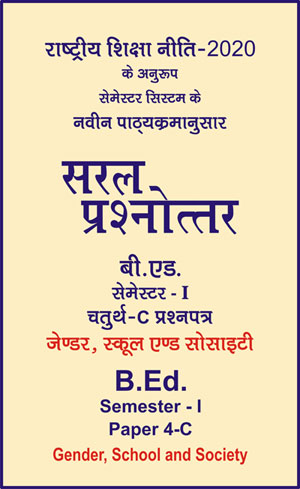|
बी एड - एम एड >> बी.एड. सेमेस्टर-1 प्रश्नपत्र-IV-C - जेण्डर, स्कूल एण्ड सोसाइटी बी.एड. सेमेस्टर-1 प्रश्नपत्र-IV-C - जेण्डर, स्कूल एण्ड सोसाइटीसरल प्रश्नोत्तर समूह
|
|
||||||
बी.एड. सेमेस्टर-1 प्रश्नपत्र-IV-C - जेण्डर, स्कूल एण्ड सोसाइटी (अंग्रेजी भाषाा में)
Question- Why is there a need for reservation for women?
Related Short Answer Questions
- When was the issue of reservation for women raised?
- What were the views of Kaka Kalelkar regarding women’s reservation?
Answer -
The first question that arises while trying to assess the need for reservation for women is: What are the objectives of these reservations to achieve, what is their purpose, and what are their criteria? In order to get an answer and understand the whole issue as a whole, it will be necessary to take a critical look at the history of women’s reservation so that many of those issues can be resolved, which should be kept in mind till the understanding of the basis and meaning of various views on today’s issue related to women’s reservation.
Although, the provisions relating to reservations for women in elected local bodies have largely contributed to the interest expressed in the issue, since they are generally regarded as a bold step towards democratization and gender justice in particular, they were, in fact, discussed vigorously in Parliament during the lengthy debates before the enactment of the above two constitutional amendments. For this reason, we must look beyond the parliamentary debates of 1989–92 to have a clear discussion on the electoral reservations for women.
The issue of political representation of women and its means too, is indeed very old; This was raised as early as 1917, when Indian women’s organizations began to try to sway the British government, demanding that women be included in the broader suffrage base provided by British India’s constitutional reforms. The main reason behind opposing the idea of reserved seats for women was that it was a departure from the demand for universal adult suffrage and to stand in elections on the same lines as men. Apart from these, it was felt that any reference to such divisions should give no indication of the subjugation of the British strategy of ‘divide, rule’. It was also felt that “before a colonial government, having learned the language of politics, the language of ethos, should be the language of equality and in favour of the fundamental rights of the citizen irrespective of gender, caste, religion or opinion”.
As far as independent India is concerned, the option of reservations for women first appeared in the report prepared by Kaka Kalelkar, Chairman of the First Backward Classes Commission, who said: “The position of women in India is very strange. We have always felt that they are living under a lot of social helplessness and that is why, they should be treated as a class at the same time as Backward Classes. But since they are not part of any separate community, they are listed in the Backward Classes. It's not even possible to go.”
This issue was again raised by the women’s movement, which for the first time made women’s political participation one of its priorities. She found a friend in Rajiv Gandhi who had rationale in favour of electoral reservations for women. The main thing was that such a position was further enhanced by his image that he wanted to have his government committed to social (and economic) modernization. The following announcement made by him shows what he expected regarding the quota of women at the local level – “We believe that the presence of a larger number of women in Panchayats will not only make Panchayats more representative but will also make them more efficient, honest, disciplined and more responsible” (Gandhi 1989: 12–13).
At that time, hardly anyone questioned or even discussed the rationale for women’s quota. Later the issue of women’s reservation was taken over by the women’s movement. The general debate on electoral reservation for women actually started only after the 73rd and 74th Constitutional Amendment Acts were passed in 1993.
|
|||||

 i
i 









